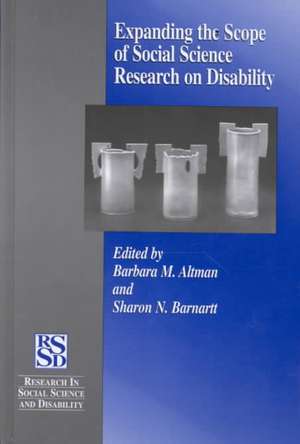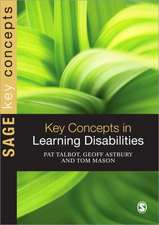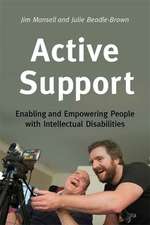Expanding the Scope of Social Science Research on Disability
Autor Barbara Altman, Sharon N. Barnartten Limba Engleză Hardback – 19 dec 2000
Preț: 792.74 lei
Preț vechi: 1029.53 lei
-23% Nou
Puncte Express: 1189
Preț estimativ în valută:
151.69€ • 158.78$ • 126.25£
151.69€ • 158.78$ • 126.25£
Carte tipărită la comandă
Livrare economică 31 martie-14 aprilie
Preluare comenzi: 021 569.72.76
Specificații
ISBN-13: 9780762305513
ISBN-10: 0762305517
Pagini: 244
Dimensiuni: 169 x 239 x 20 mm
Greutate: 0.52 kg
Ediția:New.
Editura: Emerald Publishing
ISBN-10: 0762305517
Pagini: 244
Dimensiuni: 169 x 239 x 20 mm
Greutate: 0.52 kg
Ediția:New.
Editura: Emerald Publishing
Cuprins
An introduction and invitation to social science to "get it" (B. Altman, S. Barnartt). Idiot into ape (C. Borthwick). How the news frames disability: print media coverage of the Americans with Disabilities Act (B. Haller). Gender contradictions and status dilemmas in disability (J. Lorber). Successful labor market transitions for persons with disabilities: factors affecting the probability of entering and maintaining employment (E. Yelin, L. Turpin). Research on health care experiences of people with disabilities: exploring the everyday problem of service delivery (M.L. Campbell). Disability related intentional injury hospitalizations: a multi-state analysis (L. Cornelius). Political participation of people with disabilities and the National Voter Registration Act of 1993: the road not taken (K. Schriner et al.). Stadium sightlines and wheelchair patrons: case studies in the implementation of the ADA (S. Mazumdar, G. Geis).
Recenzii
Ed Yelin, University of California at San Francisco, USA
Just received my copy of the first volume of Research in Social Science and Disabiity...There isn't an article that I didn't enjoy.
Kay Schriner, Research Professor, Fulbright Institute of International Relations
...Got the book in the mail yesterday. I love it!...An excellent work...It's so good to have this on my shelf.
Monroe Berkowitz, The State University of New Jersey, USA
I have just finished reading the articles in Expanding the Scope of Social Science Research on Disability. Congratulations for doing a wonderful job. The title is great. I think that you have expanded the boundaries.
Corinne Kirchner, American Foundation for the Blind, New York, USA
A purchaser's investment will be best rewarded by reading all chapters, and I mean "rewarded" in the sense of gaining quality information, not just quantity of pages. I have already noted the disciplinary diversity. The wide-ranging subject matter includes, among other topics, fascinating analyses of a century of perceptions of mental retardation, the framing of disability by contemporary news media, the legalistic framing of ADA Title III issues, US electoral politics among people with disabilities, and, at a basic social science level of conceptualization, "gender contradictions and status dilemmas" (p. 85) in disability.
Furthermore, as the editors emphasize, the methodological variety deserves attention in its own right. Among the qualitative examples are a thematic analysis of historical documents, case studies of judicial decisions, and an "institutional ethnography" of an innovative health care delivery project. On the quantitative side, whereas familiar techniques are applied to well-known data sets in the economists' analysis of labor market transitions and the political scientists' analysis of electoral behavior, both groups of authors pay exemplary attention to the limitations in their data sources. Two other quantitative analyses employ more novel data. One is a content analysis of 500+ print news stories and the other uses discharge records from a national sample of community hospitals to detect patterns of disability-related "intentional injuries."
Disability Studies Quarterly
Ed Yelin, University of California at San Francisco, USA Just received my copy of the first volume of Research in Social Science and Disabiity...There isn't an article that I didn't enjoy. Kay Schriner, Research Professor, Fulbright Institute of International Relations ...Got the book in the mail yesterday. I love it!...An excellent work...It's so good to have this on my shelf. Monroe Berkowitz, The State University of New Jersey, USA I have just finished reading the articles in Expanding the Scope of Social Science Research on Disability. Congratulations for doing a wonderful job. The title is great. I think that you have expanded the boundaries. Corinne Kirchner, American Foundation for the Blind, New York, USA A purchaser's investment will be best rewarded by reading all chapters, and I mean "rewarded" in the sense of gaining quality information, not just quantity of pages. I have already noted the disciplinary diversity. The wide-ranging subject matter includes, among other topics, fascinating analyses of a century of perceptions of mental retardation, the framing of disability by contemporary news media, the legalistic framing of ADA Title III issues, US electoral politics among people with disabilities, and, at a basic social science level of conceptualization, "gender contradictions and status dilemmas" (p. 85) in disability. Furthermore, as the editors emphasize, the methodological variety deserves attention in its own right. Among the qualitative examples are a thematic analysis of historical documents, case studies of judicial decisions, and an "institutional ethnography" of an innovative health care delivery project. On the quantitative side, whereas familiar techniques are applied to well-known data sets in the economists' analysis of labor market transitions and the political scientists' analysis of electoral behavior, both groups of authors pay exemplary attention to the limitations in their data sources. Two other quantitative analyses employ more novel data. One is a content analysis of 500+ print news stories and the other uses discharge records from a national sample of community hospitals to detect patterns of disability-related "intentional injuries." Disability Studies Quarterly
Just received my copy of the first volume of Research in Social Science and Disabiity...There isn't an article that I didn't enjoy.
Kay Schriner, Research Professor, Fulbright Institute of International Relations
...Got the book in the mail yesterday. I love it!...An excellent work...It's so good to have this on my shelf.
Monroe Berkowitz, The State University of New Jersey, USA
I have just finished reading the articles in Expanding the Scope of Social Science Research on Disability. Congratulations for doing a wonderful job. The title is great. I think that you have expanded the boundaries.
Corinne Kirchner, American Foundation for the Blind, New York, USA
A purchaser's investment will be best rewarded by reading all chapters, and I mean "rewarded" in the sense of gaining quality information, not just quantity of pages. I have already noted the disciplinary diversity. The wide-ranging subject matter includes, among other topics, fascinating analyses of a century of perceptions of mental retardation, the framing of disability by contemporary news media, the legalistic framing of ADA Title III issues, US electoral politics among people with disabilities, and, at a basic social science level of conceptualization, "gender contradictions and status dilemmas" (p. 85) in disability.
Furthermore, as the editors emphasize, the methodological variety deserves attention in its own right. Among the qualitative examples are a thematic analysis of historical documents, case studies of judicial decisions, and an "institutional ethnography" of an innovative health care delivery project. On the quantitative side, whereas familiar techniques are applied to well-known data sets in the economists' analysis of labor market transitions and the political scientists' analysis of electoral behavior, both groups of authors pay exemplary attention to the limitations in their data sources. Two other quantitative analyses employ more novel data. One is a content analysis of 500+ print news stories and the other uses discharge records from a national sample of community hospitals to detect patterns of disability-related "intentional injuries."
Disability Studies Quarterly
Ed Yelin, University of California at San Francisco, USA Just received my copy of the first volume of Research in Social Science and Disabiity...There isn't an article that I didn't enjoy. Kay Schriner, Research Professor, Fulbright Institute of International Relations ...Got the book in the mail yesterday. I love it!...An excellent work...It's so good to have this on my shelf. Monroe Berkowitz, The State University of New Jersey, USA I have just finished reading the articles in Expanding the Scope of Social Science Research on Disability. Congratulations for doing a wonderful job. The title is great. I think that you have expanded the boundaries. Corinne Kirchner, American Foundation for the Blind, New York, USA A purchaser's investment will be best rewarded by reading all chapters, and I mean "rewarded" in the sense of gaining quality information, not just quantity of pages. I have already noted the disciplinary diversity. The wide-ranging subject matter includes, among other topics, fascinating analyses of a century of perceptions of mental retardation, the framing of disability by contemporary news media, the legalistic framing of ADA Title III issues, US electoral politics among people with disabilities, and, at a basic social science level of conceptualization, "gender contradictions and status dilemmas" (p. 85) in disability. Furthermore, as the editors emphasize, the methodological variety deserves attention in its own right. Among the qualitative examples are a thematic analysis of historical documents, case studies of judicial decisions, and an "institutional ethnography" of an innovative health care delivery project. On the quantitative side, whereas familiar techniques are applied to well-known data sets in the economists' analysis of labor market transitions and the political scientists' analysis of electoral behavior, both groups of authors pay exemplary attention to the limitations in their data sources. Two other quantitative analyses employ more novel data. One is a content analysis of 500+ print news stories and the other uses discharge records from a national sample of community hospitals to detect patterns of disability-related "intentional injuries." Disability Studies Quarterly
















